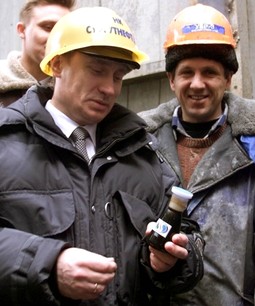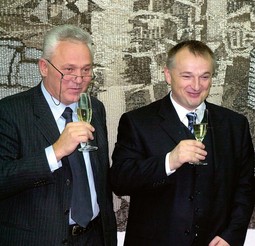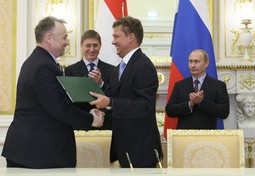PUTIN IN SURGUT The most powerful man in Russia with a oil sample, pictured in the company of Surgutneftegas employeesNow that the Russian oil company Surgutneftegas has purchased a 21 percent stake in the Hungarian oil company MOL from Austria's OMV for 1.4 billion euro, it has also gained ownership over the Croatian oil company INA, where MOL holds 47 percent of the stock. And so INA's operations have come under the direct control of Russian national policy. Surgutneftegas is, namely, the least transparent of the Russian oil companies, for which there are serious indications that it is under the direct control of the Russian national leadership, and one of whose alleged owners is none other than Russian Prime Minister Vladimir Putin.
And while all Russian oil companies have firm political links and enjoy the significant support of the Russian diplomacy in expanding their operations, the situation in Surgutneftegas is very different from those in Rosneft, Gazprom and other Russian corporations. The company's stock is not available on the stock exchange, and as such is under no obligation to reveal its entire ownership structure. Back in mid 2003 the top people at the company transferred 42 percent of the ownership to the account of an unknown fund, and the owners of these shares are unknown, even though they are listed in the company's financial reports as treasury shares.
Four years later well-known Russian political analyst Stanislav Belkovsky said in an interview with the German daily Die Welt that 37 percent of Surgutneftegas was owned personally by then Russian President, and now Prime Minister, Vladimir Putin. The veracity of these claims have never been confirmed, but Surgutneftegas continues to be considered a company very close to the Russian national leadership. So the entry of Surgutneftegas into the ownership structure of MOL can be considered a continuation of the Russian strategy of expanding its operations to European countries and the development of as large as possible a distribution network.
The development of a retail network in European countries serves, namely, two goals. The first is economic, because Russian companies achieve a much greater profit through the sale of derivatives than just through the sale of crude oil. The other reason is geopolitical, because the development of Russian oil companies also strengthens Russia's political influence in these countries. And since the markets of Western European states are, for political reasons, closed to Russian companies, they have concentrated their expansion towards Central and Eastern Europe. So far Lukoil, a Russian company operating in Bulgaria, Serbia, Croatia, Bosnia & Herzegovina and Macedonia, has been the most active in the region. But, Lukoil is a privately owned company, while companies under the direct control of the Russian government have now begun to appear in the region, such as Gazprom, which purchased the Naftna industrija Srbije Company in Serbia, and NeftgazInKor, a company that owns the refinery in Bosanski Brod. But it is the arrival of Surgutneftegas in Hungary that is the most significant moment so far in the Russian offensive, because Hungary is the strategically most important country in the region, and because of the possibility that Vladimir Putin in person stands behind the company. And that is why it is no wonder that some high-ranking INA managers are of the opinion that the purchase of a stake in MOL is a significant triumph for the Russians over the European Union.
Nacional's source, which wishes to remain anonymous, claims that the arrival of Surgutneftegas in Hungary is a significant threat to European energy plans. "With the purchase of 21.2 percent of the Hungarian oil company MOL, Russia's Surgutneftegas has finally succeeded in achieving one of the long-term geopolitical goals of Russian foreign policy. For years now the big Russian companies have tried to get a foothold in Central Europe, but that had not happened for them until now. Lukoil, for example, at one point wanted to buy Slovenia's Petrol, only to have it prevented in the end by the European Union. But, now that the Russia's have entered MOL, it is hard to believe that they can be stopped in taking over THE SALE OF 25 PERCENT PLUS ONE SHARE OF INA STOCK TO MOL: INA CEO Dragicevic and MOL boss Hernádithe entire company in the end, and with it gaining a significant influence on the region's energy system. MOL is for several reasons an excellent partner to the Russian company and an excellent launch pad for further expansion into the markets of neighbouring countries. This is a big Russian triumph, and a significant defeat of a common European energy strategy."
Surgutneftegas itself, although relatively unknown to the broader public, is a large and powerful company. Its market capitalisation is estimated at 22.7 billion US dollars. This is not surprising if one knows that Surgutneftegas covers 13 percent of total Russian oil production, and just in 2007 the company saw earnings of over 13 billion euro. The company is based in the western Siberian city of Surgut, and the refinery, with a total capacity of 17.3 million tonnes, is situated in the city of Kirishi, near St. Petersburg. The company has been run for decades by Vladimir Leonidovich Bogdanov, and it emerged from the once socialist company Surgut, taken over during its privatisation by its managers.
Today its employs over 100 thousand people and owns over 50 daughter companies in various sectors of the economy. Surgutneftegas now owns a furniture factory, an insurer, a construction firm, and even agricultural production. The Slovenian oil company Petrol had good relations with Surgutneftegas in the 1990s, a part of which was the very lucrative export of Slovenia products to the Siberian region in which Surgut is situated.
And while it is major producer of oil, the Russian company does not have a very well developed distribution network, and owns three hundred petrol filling stations across Russia, which is very little by Russian standards. It is in this, in fact, that many analysts see the reason why the Russian company decided to by the MOL shares at a very high price. Surgutneftegas, namely, paid the shares twice their current value on the stock exchange. This is quite solid evidence of the fact that the Russians wanted to buy the OMV stake at all costs and that they are counting on a further growth of their stake in the company in the future. Had they wanted a minority stake they could have purchased a much cheaper stake in MOL sold at a public auction by the Oman Oil Company.
It can be concluded from this that the Russian company has decided to take a strong position in the MOL ownership structure, and given that some investment funds hold significant stakes in MOL, it is possible that the Russian stake is greater still. But even if it is not they will today, with 21 percent of the ownership, have a much greater influence on the company's operations than the same stake would have afforded them a few years ago. There are two reasons for this today. The first is that MOL is financially exhausted by the recession and the drop in the price of crude oil, and its big financial partners such as the OTP Bank are in even worse shape. MOL, which is, with the support of the Hungarian government, under the control of its board of directors, has in the past greatly depended on the financial support of Hungarian banks. It was with their help, in fact, that MOL defended itself two years ago from a hostile takeover attempt on the part of OMV. The banks then provided credit to MOL to buy back its own shares on the exchange.
The company now has many treasury shares, which are very expensive, but do not have voting rights in decisions related to the running the company. On the other hand this is exactly why the Russian's 21 percent is worth more than usually in terms of influencing the way the company is run. On Monday the MOL management declined to comment the entry of the Russian company into the MOL ownership structure. The likely reason for this is that the MOL management, led by Zsolt Hernádi, is still unsure of how to position itself towards Surgutneftegas.
Had this transaction occurred a year ago, namely, MOL would have almost certainly characterised the arrival of the Russians as unacceptable, but much has changed since them. The Hungarian company is now financially drained, is only worth a fraction of its former value, and the management no longer enjoys the support of domestic banks and politicians, also exhausted by the recession. In these circumstances the top people at MOL have no desire to embark into a conflict with the much larger and wealthier Surgutneftegas, especially if Vladimir Putin is personally behind the company.
But, if Surgutneftegas succeeds in taking over MOL in the future, experts forecast that it would significantly alter the energy landscape in this part of Europe. Mol, namely, unlike the Russian company, has a developed retail network, very modern refineries in Százhalombatta and Bratislava, and natural gas pipeline infrastructure in Hungary. With INA capacities, the company has very good synergies with Surgutneftegas, and the foundation the Russian company needs to start selling its oil on the Central European market.
FERENC GYURCSANY AND VLADIMIR PUTIN watch MOL boss Zsolt Hernádi and Gazprom boss Alexei Miller sign a deal on the construction of the Southern Stream natural gas pipelineA Russian oil pipeline passes through Hungary, namely, and the large Southern Stream natural gas pipeline is to pass that way soon, as is the DruzbAdria oil pipeline. And Hungary is a member of the European Union, so that the Russians can increase the European energy dependence on Russia by way of MOL, and can by way of INA even gain access to the lucrative Mediterranean market.
That is why the question arises in what measure Surgutneftegas will in the future affect the operations of INA. In Croatian Government, still the second largest stakeholder in INA, they say that the entry into the ownership structure will not affect the operations of INA.
Nacional's source, close to the top people in Government, says that the stockholder contract Government signed with MOL does not allow any kind of change in the way the company does its business. "For us the situation has not changed much. The place of one co-owner with 10 percent of the stock with voting rights has been taken by another that, as far as we know should act as a financial investor, at least in the coming period. Of course we will discuss the entire situation once again with MOL these days. A significant change of ownership structure, in the context of our relations and signed documents, implies a takeover, which is in no way the case here."
But, in spite of Government's optimism, is can be assumed that the Russian pressure on Croatia will continue. Besides a traditional dependency on Russian natural gas, Surgutneftegas is a new strong card in the hands of Russian policy makers. Government still holds 44 percent of INA, and has to reduce this stake to 25 percent by the time we enter the European Union. If the Russian company is interested in these shares, strong pressure can be expected on Government, especially given the ongoing talks with Gazprom on a new long-term contract on the delivery of natural gas, and on connecting Croatia with the Southern Stream Russian natural gas pipeline.
WHAT IS SURGUTNEFTEGAS
The market capitalisation of Surgutneftegas is estimated to be 22.7 billion US dollars. Surgutneftegas covers 13 percent of the overall Russian production of crude oil. The company is based in the western Siberian city of Surgut, and the refinery, with a total capacity of 17.3 million tonnes, is situated in the city of Kirishi, near St. Petersburg. The company has been run for decades by Vladimir Leonidovich Bogdanov, and it emerged from the once socialist company Surgut, taken over during its privatisation by its managers. It currently employs over 100 thousand people.
INA WILL BE HARD PRESSED TO AVOID A SALE TO THE RUSSIANS
Croatian Government currently owns 44 percent of INA, and by the time we accede to the European Union, it has to cut its stake to 25 percent. When the remaining shares are sold the pressure from the Russians to buy them will be great and Government will be hard pressed to resist. Indicative of just how much the Russians are interested in expanding into Central Europe is the fact that they paid twice the market value for the MOL stock.







